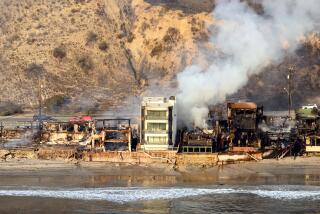L.A.-area residents out of town during fires share agony of watching homes burn from afar

- Share via
Diego Wallraff was attending a retreat in India when his apartment building in Pacific Palisades burned down last week. A somatic therapist and actor, he lost most of his most treasured possessions, including the irreplaceable Tibetan singing bowls and gongs he’s collected over 15 years of world travels.
At first, Wallraff, 63, thought his home was spared. The fire-tracking app Watch Duty showed the blaze hadn’t spread to his part of the Palisades. But that turned out to be false hope — the app’s map was hours behind what was happening on the ground in real time.
“Then, all of a sudden, it updated and showed that the red fire zone had spread all over the whole area,” he said. He felt an “emotional sensation” in his body: “Wait, have I just lost everything I own?”
Soon, he got confirmation through an image of his building “left in rubble.”
Wallraff is a member of a grief-stricken fraternity of Los Angeles County residents who have watched from afar in horror as the lives they knew went up in smoke amid the ferocious Palisades and Eaton fires.
In interviews with several residents whose homes were destroyed while they were in places as far away as Europe, Asia and New York, they shared a range of similar feelings: A sense of helplessness in the face of nature’s wrath. Panic as they waited to find out whether their homes were still standing. Guilt for having been away during the tragedy, mixed with the sense that things could have been so much worse.
Owners of homes in Pacific Palisades say they are frustrated that they have been barred from returning to fetch belongings amid reports of looting and concerns about additional fires that threaten the remaining properties left standing.
By Saturday, Wallraff was taking some positive lessons from his experience that week, which caused him to reflect on the love of his family and friends.
“We don’t have a guarantee of anything in this life. It could be over tomorrow or it could be over in 10 minutes,” he said. “It highlights the interconnectedness of us all. It doesn’t matter what community you’re in, fire doesn’t discriminate.”
Helena Stuart and her husband were at their second home in New York on Tuesday when they learned that a large-scale fire was sweeping through the Palisades, where in 1994 they bought property for their dream home.
At first, she wondered whether they should catch a flight back to L.A. But she soon received a video from a neighbor showing that their sun-washed stucco home on a narrow lane with vast views of the Pacific Ocean had been reduced to ruins.
“I started crying. My husband said, ‘Well, we’re lucky we’re not there, aren’t you glad we’re not there?’ ” she said. “I said no, because at first, you want to be there to do something. But there’s really nothing, nothing, nothing you can do.”
By Friday, Stuart, 73, said she still felt “crushed and numb and sad, and all those devastating feelings.”
But she also felt gratitude.
Only Hearts, the boutique she opened in Santa Monica in 1989, is still standing, though she has been nervous about its fate since the Palisades fire evacuation zone was expanded last week to include swaths of the coastal city.
“I can’t even watch this on TV,” she said.
Richard Kipling and his wife, Alison Sowden, were at their second home in Santa Fe, N.M., when they learned that their house in Altadena had been consumed by the Eaton fire.
Kipling, a retired Los Angeles Times editor and journalism professor, said he doesn’t believe there’s much they could have done had they been in California.
“There was such chaos going on,” he said. “When you’re out of town, at least you’re removed from the maelstrom and you don’t have to breathe the terrible air or drink the terrible water.”
The couple learned from neighbors who had been evacuated that their house was one of more than two dozen on their block destroyed by the fire. They were planning on returning Thursday, but their insurance adjuster told them there was no reason to — they wouldn’t be allowed into their neighborhood and the rubble the fire left behind is highly toxic.
Coverage of the fires ravaging Altadena, Malibu, Pacific Palisades and Pasadena, including stories about the devastation, issues firefighters faced and the weather.
So Kipling, 80, is left with a strange combination of gratitude and grief.
“We were lucky we didn’t get burned up in the fire. And we’re lucky we have a second home to stay in here in Santa Fe,” he said. “But in terms of the sense of loss, it’s terrible … It is just devastating for the community, which we love.”
He also described a version of the survivor’s guilt shared among those fortunate enough to avoid painful experiences when others are left to suffer.
“Our friends were right there going through the pain and agony of knowing that their homes don’t exist, and we’re here in this beautiful place,” he said. “We feel for them. But since knowing our home was destroyed, it’s hard for us, too.”
Today, between the toxic aftermath of the fire and the challenges of dealing with insurers and housing red tape, Kipling and Sowden aren’t sure whether they’ll build another home to replace the one they lost.
“I’m 80 years old,” Kipling said. “I said to my wife, ‘You know, if we decide to rebuild I may not see the end of the rebuild.’”
More to Read
Sign up for Essential California
The most important California stories and recommendations in your inbox every morning.
You may occasionally receive promotional content from the Los Angeles Times.













